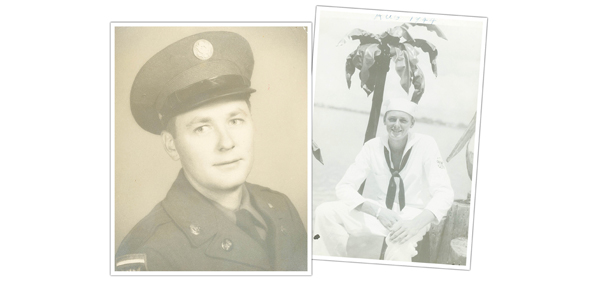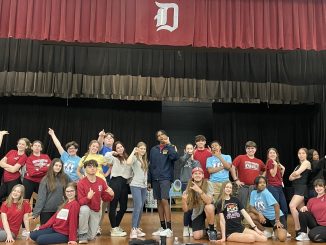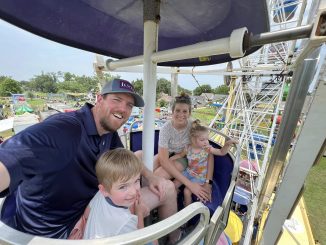
Saw devastation of Japan, wonders of Italy
Jack McCully was 16 years old in 1944 when he decided he wanted to join the Army Transportation Corps, but it was not without resistance.
McCully, now 85, said he felt like he needed to do what he could do. Not being old enough to join a fighting unit he did the next best thing, he joined up to help keep supplies flowing into the Asian theater.
“My mom did not want me to join,” he said. “I already had two brothers fighting in the Pacific, but I kept on talking to her and she finally gave in. I did what I shouldn’t have done. I went against my mother’s wishes.”
So he packed his bags and took the first big trip of his life to Saint Petersburg, Fla. where he completed training to work in the engine room of a transportation vessel.
After only a few months the teenager from tiny Sweeny, Texas found himself aboard an oceangoing ship with a load of phosphorus, headed for the Panama Canal and then from there to Asia.
He was not alone though. The Army Transportation Corps was almost entirely made up of teenagers who had only a little life experience.
“They took us from 16 to 17 ½ years old, but they wouldn’t take them any older than that because the Army was fixing to get them,” he said. “Can you imagine 16-year-old boys getting in there and doing stuff like that? They had to take us because they couldn’t get nobody else!”
McCully went to work in the ship’s engine room with a group of other teenagers, working shifts of four hours on and eight hours off in hot close quarters, oiling the engines and firing boilers to ensure the ship kept running.
“It wasn’t cool down there, but that’s the kind of work I did and I liked it,” he said. “You had to watch out when you were lighting the boiler that it didn’t cause an explosion. It happened to me one time and I got a black eye.”
Within days after setting on its course to New Zealand, the ship faced a major setback after it was hit by a large storm.
“When we left Tampa and we went out in the Caribbean it turned us nearly a 45 degree angle. It’s a wonder we didn’t go overboard,” he said. “If all of that stuff would have got wet, man you talk about an explosion.”
After traveling through the Panama Canal and dropping off their load of fertilizer in New Zealand without incident they headed to Sydney, Australia to pick up their first load of weaponry.
“We loaded up with all kinds of ammunition and guns and everything,” he said.
Now they would be the target of potential attacks from Japanese war planes and would require a convoy to protect them.
Despite the inherent dangers in carrying hazardous and explosive materials, and the threat of enemies attacking their transport ship, McCully said he and his crewmates had it much better than the Army Transportation Corps members who went to the European front.
“Submarines and dive bombers that blew them all to pieces. They blew them up,” he said. “Those guys figured it was a one way trip and it was.”
McCully was lucky in that he arrived in the Philippines just as the war was wrapping up. In fact, not long after coming ashore he was able to reconnect with one of his brothers who had received a shrapnel wound to his face in ground fighting.
“He surprised me. The war was just over and he came onboard my ship and came up there,” he said. “I didn’t recognize him at first and he said ‘Hey Buck!’ That was my nickname, so I knew it was my brother and we just went off and had a real good time over there.”
Although his time in the war effort ended almost as quickly as it had begun, he stayed in and ended up staying in Japan to help with rebuilding efforts working in the engine room of a ship based out of Yokohama.
“The devastation that I saw from Yokohama to Tokyo was shocking. The only thing that was standing was the smokestacks, the buildings had been completely destroyed,” he said.
In his time there he said he came to terms with the Japanese citizens whose country only days before had been in all out war with the United States.
In fact, McCully began a lifelong interest studying different languages by picking up some Japanese.
“I didn’t have any animosity toward anybody. I went over and stayed over there for a length of time and met a lot of people,” he said.
After 17 months he headed back home and worked in the Texas oil fields for about a year before the Korean War broke out and he enlisted in the Army as an engineer.
Despite having already been in Asia during World War II, McCully was stationed in Trieste, Italy throughout the next four years where he worked mainly as a truck driver and actually lived a pretty normal life.
“The people in Italy were much friendlier than in Japan and it wasn’t quite as devastated,” he said.
McCully said he picked up the Italian language rather easily, married an Italian woman and the two soon had a daughter.
“She didn’t speak English so I had to pick up Italian,” he said.
Despite the fact that a war was going on, McCully said the only time there was conflict was when the newly communist Yugoslavia gathered at the border in what he said was an attempt to take over the port of Trieste. That was when he was deployed to an infantry unit for the first and only time.
“They were gathered at the border. You see the Jugs, we called them, they wanted Trieste. They didn’t have any real seaports, all they had was some rinky-dink ports. They had a rail line, a shipping line and a big, big trucking line, but they didn’t had a good port city,” he said. “They had enough soldiers to push us off the map into the Adriatic Sea and we had to call out a tank company and everybody else and they didn’t go through with it.”
After finishing his tour of duty in 1953, McCully returned to Texas with his new family and began what would be a lifetime of working as a roughneck in oilfields and on offshore platforms throughout Texas and then later in southern Louisiana using the skills and drive he picked up while serving the country.
The bulk of his career was spent on offshore platforms in the Gulf of Mexico of Louisiana’s coast. Having grown accustomed to being at sea as a teenager, he said he enjoyed the being out on the water. Eventually he moved through the ranks and became and pumper and then a finally a mechanic before was offered a buyout and retired with his second wife to Bayou Gauche where he has been for the past 24 years.
Being 16 when he enlisted in the service, McCully is the youngest World War II veteran at the Veterans of Foreign Wars Hall in Luling and very likely the parish.
Although it took him a lifetime to end up in St. Charles Parish, he would not want to be anywhere else.
“The culture and the people here are just great,” McCully said.
This profile is part of an ongoing series between the St. Charles Herald-Guide and the Veterans of Foreign Wars Post 3750.




Be the first to comment